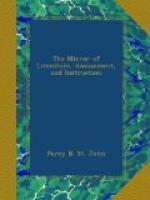“That, sir, is no oculist, no surgeon; it is my Karl, sir, my beloved son!” I shall never forget the voice, struggling with emotion, in which the old man pronounced the words “mein sohn!”
The story of that son was one of deep, though humble interest. Trained in the agricultural habits of his forefathers, and destined to succeed to the laborious honours of the Stroerische farm, young Karl, to whom his gray-haired father was an object of the fondest and most reverential affection, beheld with horror the gradual advances of the disease which was about to render the remaining years of life a burden to the sightless man. With the fractiousness of advancing age and growing infirmity, old Philipp obstinately refused to seek the assistance of any learned leech of the country round. Brannau and Burchhausen boasted each of a chirurgic wonder, but Stroer misdoubted or defied their skill. “His frail body,” he said, “was in the hands of a heavenly Providence, to which, as might best beseem, he bequeathed its guidance.” Meanwhile, the perilous uncertainty of his footing, and the growing isolation of his existence, became more and more perceptible, when one day, just as an acknowledgement of “total eclipse” had fallen from his quivering lips, the prop and stay of his household, his beloved son Karl was missing from the farm! The first moment of uncertainty touching his destinies was a trying one, but it was also brief. A few days brought a letter from Munich, in which the absconded son implored his father’s forgiveness, forbearance, and patience, during some ensuing months. Time, he wrote, might alone explain the motives of duty which had caused his apparent error.
Patience is a difficult virtue to the sick and the unhappy. The blind man, pining for his absent Karl, had need of all his trust in the excellence of his favourite child: at times, misdoubtings naturally arose; for the few months lengthened into seven, eight—eleven—a whole year, and the wanderer came not again.
At length, one autumn evening, a general shriek from the little household apprized Philipp Stroer of some unwonted occurrence, and straightway a voice demanded his blessing, and warm tears were wept upon his hand, and he knew that his son was at his feet! The story of Karl’s absence was briefly and feelingly explained. Moved by his father’s obstinate aversion to place himself in the hands of a strange practitioner, he had resolved to qualify himself for so precious a charge; and having interested an eminent surgeon of Munich by the detail of his affecting anxieties sufficiently to insure his instructions in the single branch of surgery requisite for his purpose, Karl had passed his days in infirmaries and hospitals, denying himself the common sustenance of nature, in order to maintain the respectability of garb necessary for his admittance to the lectures of his scientific preceptor. At length, his ardent endeavours were rewarded by a




